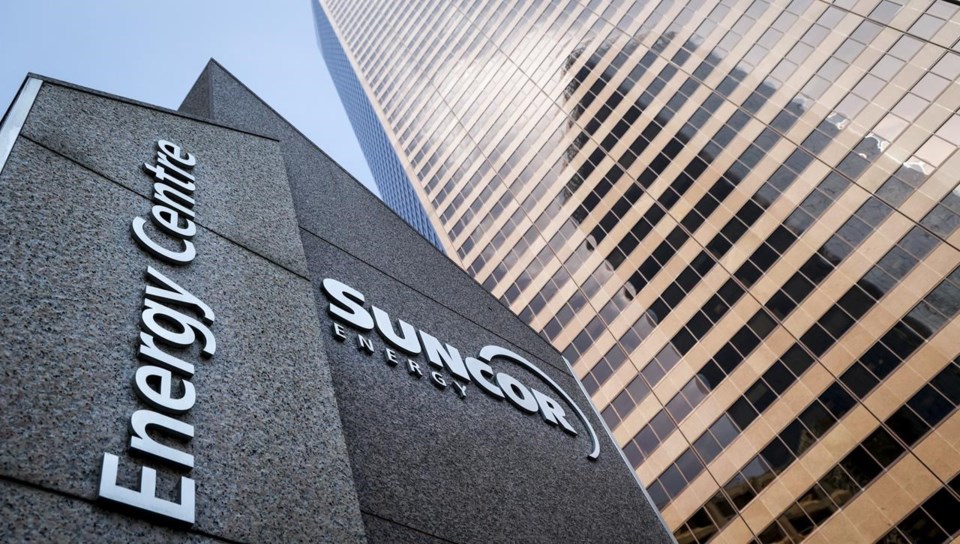CALGARY ÔÇö Oilsands giant Suncor Energy Inc., which has been heavily criticized in recent years for an abnormally high number of workplace deaths at its sites, reported that 2023 was its best year ever in terms of worker safety.
CEO Rich Kruger told analysts on a conference call that Suncor achieved its best overall employee and contractor safety performance in the company's history last year.
"We had no life-altering or life-threatening injuries for the first time since 2015," Kruger said on Thursday. 
"We had a nearly 50 per cent reduction in lost-time incidents year-over-year and we had our best-ever recordable incident rate in the downstream and our second-best-ever in the upstream."
The news marks a major turnaround for the Calgary-based energy company, which between 2014 and 2022 had at least 12 workplace deaths at its sites, more than the rest of its oilsands peers combined.
Suncor's safety record was so poor that it attracted the attention of U.S.-based activist investor Elliott Investment Management, who in 2022 made a public case for an overhaul of the company's board and management.
Kruger himself, the former CEO of ExxonMobil's Canadian subsidiary Imperial Oil Ltd., was lured out of retirement last year to lead a restructuring at Suncor in the wake of a spate of high-profile operational and financial challenges at the company.
He replaced interim CEO Kris Smith, who temporarily held down the fort following the 2022 resignation of Mark Little, who stepped down as chief executive one day after the death of a worker at Suncor's Base Mine near Fort McMurray, Alta.
Kruger has implemented a number of changes at Suncor during his approximately one year on the job, including reducing the company's employee head count by 20 per cent, or 1,500 people, in order to eliminate unnecessary or "unaffordable" work.
That move, which cost the company $275 million in severance, was worth $450 million in annual savings, Kruger said.
With what Kruger defined as an "overall urgency to improve performance," Suncor has also restructured its site teams, introduced a new performance evaluation system for employees and managers, and worked to improve asset reliability.
The result of all of these initiatives is that the company met its external financial guidance for the first time in six years in 2023, he said.
But Kruger said there is still room for improvement, including at its Terra Nova offshore oil platform off the coast of Newfoundland, where startup of production was delayed longer than expected.
ÔÇ£Despite overall strong financial and operating performance in 2023, I look at it as we also left some on the table," he said.
One area Suncor will focus on in 2024 is cutting costs in the oilsands to keep pace with some of its more cost-efficient peers. The company is investing in driverless, or autonomous, mining trucks in order to cut down on operating costs, and expects to double its autonomous fleet to 91 vehicles this year. 
By the end of the year, all of the ore at Suncor's Base Mine will be moved autonomously, Kruger said, adding the switch to driverless technology is expected to save the company about $1 million per truck per year.
Suncor earned $2.82 billion in the fourth quarter of 2023, up from $2.74 billion in the same period of 2022, the company reported after the close of markets Wednesday.
The company said its net earnings for the three months ended Dec. 31 work out to $2.18 per common share, and included a $1.13 billion non-cash gain as a result of the company's acquisition of TotalEnergies' Canadian oilsands operations.
On an adjusted basis, Suncor said its operating earnings were $1.64 billion, or $1.26 per common share, in the fourth quarter, compared with $2.43 billion in the prior year's quarter.
The company said the decrease was primarily due to lower crude oil prices and a weaker business environment.
Suncor's total upstream production in the quarter was 808,100 barrels of oil equivalent per day, the second-highest quarter in the company's history, while its oilsands production hit an all-time record of 757,400 boe/d.
RBC Capital Markets analyst Greg Pardy called the results "impressive" and said in a note that he is reaffirming his "outperform" rating on the stock.
"As a turnaround story, SuncorÔÇÖs strong fourth-quarter results reinforced our confidence in the companyÔÇÖs improving operating/financial momentum ÔÇö which we think will translate into relative share price appreciation over time," Pardy wrote.
Suncor also announced Wednesday that its board chair Michael Wilson will retire. He will be replaced by Russ Girling, a former CEO of TC Energy Corp. who has served on Suncor's board since 2021, effective March 15.
This report by The Canadian Press was first published Feb. 22, 2024.
Companies in this story: (TSX:SU)
Amanda Stephenson, The Canadian Press



